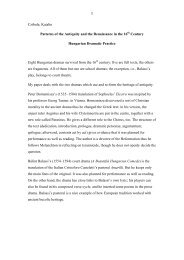Amir Weiner Getting to Know You
Amir Weiner Getting to Know You
Amir Weiner Getting to Know You
Create successful ePaper yourself
Turn your PDF publications into a flip-book with our unique Google optimized e-Paper software.
6 AMIR WEINER AND AIGI RAHI-TAMM<br />
new modes of socialization. Even the most astute studies of denunciations,<br />
however, profess that this was not the main source of information for the<br />
Soviet regime, if only because of their unpredictability and the fact that<br />
they were solicited by the regime at specific moments, especially during<br />
mobilization campaigns for certain policies or against targeted individuals<br />
and groups. 2<br />
Since the opening of the former Soviet archives, scholars have focused<br />
mainly on public opinion, deciphered from the voluminous reports on<br />
the political mood of the population gathered by the political police and<br />
submitted <strong>to</strong> party-state organizations and leaders, despite the absence of the<br />
term “popular opinion” from the Soviet political lexicon under Stalin. 3 A<br />
handful of insightful studies situate Soviet police reports within a modern<br />
pan-European ethos of socio-political engineering and the evolution of<br />
the late imperial polity. They offer fresh interpretations of the essence of the<br />
system and its values, as well as invaluable comparative angles, albeit with<br />
the price tag of universalizing distinct socialist <strong>to</strong>talitarian features. 4<br />
This essay tackles an additional and new set of questions that help explain<br />
the oft, although unsurprisingly, ambiguous record of Soviet surveillance on<br />
the ground, which was <strong>to</strong>rn between <strong>to</strong>talitarian aspirations and institutions<br />
and the corresponding quota system, collateral damage, and constant pressure<br />
for immediate results, on the one hand, and the aspiration <strong>to</strong> professional<br />
pride and ethos of its police officers, on the other. What did the Soviets<br />
initially know about populations on which they imposed their rule? What<br />
did they want <strong>to</strong> know? How did they obtain their information and recruit<br />
informants? How successful was the surveillance enterprise according <strong>to</strong> the<br />
2 On denunciations as a key feature in the initial phase of the <strong>to</strong>talitarian revolution, see<br />
the indispensable discussion by Jan T. Gross, Revolution from Abroad: The Soviet Conquest<br />
of Poland’s Western Ukraine and Western Belorussia (Prince<strong>to</strong>n, NJ: Prince<strong>to</strong>n University<br />
Press, 1988), 114–22. For consideration of denunciations as “weapons of the weak,” see<br />
Sheila Fitzpatrick, “Signals from Below: Soviet Letters of Denunciation of the 1930s”; for<br />
denunciations as mainly a <strong>to</strong>ol by the <strong>to</strong>p leadership <strong>to</strong> rattle its bureaucracy, see Vladimir<br />
Kozlov, “Denunciation and Its Functions in Soviet Governance: A Study of Denunciations<br />
and Their Bureaucratic Handling from Soviet Police Archives, 1944–1953,” both in Accusa<strong>to</strong>ry<br />
Practices: Denunciations in Modern European His<strong>to</strong>ry, 1789–1989, ed. Fitzpatrick and Robert<br />
Gellately (Chicago: University of Chicago Press, 1997), 85–120 and 121–52, respectively.<br />
3 For an insightful survey of these problems, see Jan Plamper, “Beyond Binaries: Popular<br />
Opinion in Stalinism,” in Popular Opinion in Totalitarian Regimes: Fascism, Nazism,<br />
Communism, ed. Paul Corner (Oxford: Oxford University Press, 2009), 64–80.<br />
4 Peter Holquist’s pathbreaking studies of Soviet surveillance reports and their contemporary<br />
counterparts still remain an anomaly. See his Making War, Forging Revolution: Russia’s Continuum<br />
of Crisis, 1914–1921 (Cambridge, MA: Harvard University Press, 2003); and “Information Is<br />
the Alpha and Omega of Our Work: Bolshevik Surveillance in Its Pan-European Context,”<br />
Journal of Modern His<strong>to</strong>ry 69, 3 (1997): 415–50.

















